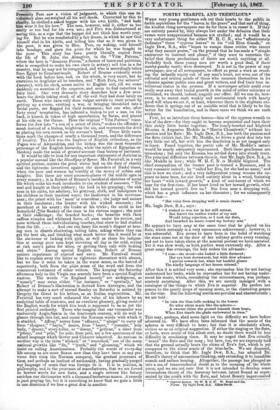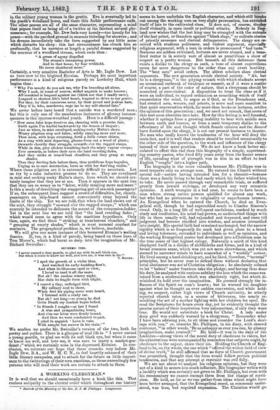POETRY TEARFUL AND TREMULOUS.* WHIN very young gentlemen sob out
their hearts to the public in feeble aspirations for the " haven in the grave" and that sort. of thing,
the kindest thing newspapers can do for them is to resent it. If they
are entirely passed by, they always live under the delusion that their verses were unappreciated because not studied ; and it would be a very unfortunate thing for either W. H. C. N., who "affectionately dedicates" these "cypress leaves" to his "old Eton friends," or Ingle Dew, B.A., who "hopes to escape those critics who resent what they cannot praise," on the ground that he has made a "simple endeavour to instruct and please," if they were to entertain the belief that these productions of theirs are worth anything at all. Probably both these young men are worth a good deal, if their namby-pamby vanity were destroyed. It is not in the power of any newspaper, nor of all newspapers, to effect so great a work as crush- ing the imbecile vanity out of any man's heart, not even out of the editorial and critical minds of those who measure themselves in its columns against public men and great writers, and find their tree in- tellectual status in the process. If a newspaper article could ever really sear away that tumid growth in the mind of either criticizer or criticized, we should, indeed, magnify our office. All we can do, how- ever, is to resent such weakly and sentimental trash with hearty good will when we see it, at least, wherever there is the slightest evi- dence that it springs out of an amiable mind that is likely to be the better for the humiliation, and in these cases we think we see such evidence.
First, let us introduce these heroes—hilieof the cypress-wreath to lihn of the dew—for they ought to become acquainted and burn their thin sickly little books together. The lonely-hearted and blighted Etonian is Augustus Moddle in "Martin Chuzzlewit," without his. passion and his flute : Mr. Ingle Dew, B.A., has both the passion and the flute (which last, like Mr. Moddle, he blows a great deal into but very little out of), but with him the desolation is as yet imaged only in fancy. Fused together, the poetic side of Mr. Moddle's nature would be nearly adequately represented. Both these gentlemen are tremulous ; but only the Etonian has settled down into steady tears. The principal difference between them is, that Mr. Ingle Dew, B.A., is.
like Moddle in love; while W. H. C. N..is Moddle blighted. The
chief composition of the former poet is termed a Romance, and is very romantic indeed; he "called her Eva, for she had no name," and this is how we start ; and a very independent young woman she ap- pears to have been, for she lived entirely alone in a wood, fostering her heart "with inward growth," a kind of nutriment of which we hear for the first time. If her heart lived on her inward growth, what did her inward growth live on? She lives near a dropping well, which has a great influence on her character ; for we subsequently learn that-
" Her voice from dropping well is music drawn."
Mr. Ingle Dew, B.A.., says :
"I wished to woo her in her still retreat, But feared the sudden tender of my suit Would bring rejection, so I took my flute,
And breathed its music round my bowery seat."
He appears to have sung at the same time that he played on his flute which certainly is a very uncommon achievement ; however, it was sifecessfal. Eva seems to have been in the habit of watching the stars come out at the door of her solitary grotto every evening, and not to have taken alarm at the musical portent we have narrated. Yet it was slow work, as both parties were extremely shy. After a great many fine evenings, the lady makes the advances : "I rose—she stood—she looked a little fluttered;
Her eye bent downwards, but with slow advance I moved towards her, when her bashful glance The kindly language of her bosom uttered."
After this it is settled very soon ; she reproaches him for not having understood her looks, while he reproaches her for not having under- stood his music, which, considering the circumstances, was perhaps scarcely surprising. After this, we are merely indulged with a catalogue of the things to which Eva is superior. He prefers her graces to the pearly drops of opening morn, or the clustering grapes on the vine. But the following merits are peculiar and characteristic ; we are told :
"In vain the blue-bells rocking in the breeze Do utter silent music like the spheres— A sweeter chime the ground beneath them hears, When Eva treads the glade embowered in trees."
This may, perhaps, shed some light on the difficulty we have before adverted to. We have often been informed that the music of the spheres is very difficult to hear; but that it is absolutely silent, strikes us as an original suggestion. If either the singing or the flute, or both, were music of this silent sort, no doubt there would be less. difficulty in combining them. It may be urged that Eva actually "heard" the flute and the song; but here, too, we are expressly told that the ground actually hears the chime of Eva's feet, which is yet compared to the silent music of the blue-bells. We are disposed, therefore, to think that Mr. Ingle Dew, B.A., has adopted Dr. MorelPs theory of unconscious thinking, only extending it to inaudible sounds and earless hearing. Altogether, the passage has plunged us into a sea of transcendental doubt as to the meaning of the whole poem, and we are not sure that it is not intended to develop some tremendous theory of the harmony between latent Sound as repre- sented by the youth with the flute, and latent Beauty impersonated • Cypress Leaves. By W. U. ç. N: W. Kent and Cs. Poems. By Ingle Dew, s.a. sfutot stook.
in the solitary young woman in the grotto. Eva is eventually led to the youth's woodland home, and there this feeble performance ends. The other poems are all of the same character, representing a mind that piques itself as being all of a twitter at the faintest natural phe- nomenon; for example, Mr. Dew feels very keenly—too keenly for his peace—with the parched ground in summer thirsting for showers ; and his dreams immediately take the form suggested by any little noise which disturbs his sleep : this last circumstance has struck him so profoundly, that he narrates at length a painful dream suggested by the murmur of a woodland stream, which ends thus :
"A groan of agony dispelled The stream's entrancing power, And in that house, by fear withheld, He never slumbered more."
Certainly, a very sensitive Bachelor of Arts is Mr. Ingle Dew. Let us turn now to the blighted Etonian. Perhaps his most important performance is a kind of religious parody on Locksley Hall, which begins thus :
"Why I'm moody do you ask me, why I'm brooding all alone, Why! seek, in tones of sorrow, stifled anguish to make known ; All mankind is leagued against me (think not that I madly rave), Leagued to shorten life's brief hours, leagued to drive to my grave ; For they, by their rancorous envy, by their proud and jealous hate, They it is, who, murderers, urge me to my self-elected fate."
We never before have beard that a suicide was a murdered man; but this is only one of the numberless instances of gloomy inconse-
quence& in this cypress-wreathed youth. Here is a difficult passage : "Now anon false hope deceives me, cheering with a promise fair, Swift again I'm hurled backwards by the demon of despair ; Just as when, in mist enveloped, seeking rocky Malta's shore, Weary pilgrims stop and falter, wildly straying more and more. Then anon, with hope returning, forth a little corner shines, Is a crag with mist departing, gleams from out a wood of pines ; Onwards cheerily they struggle, onwards o'er the rugged steeps, While in dim, grey circlets wreathing back the misty vapour creeps ; Ever onwards, as before their eyes the land receding fades, And they strike at treach'rous cloudlets, and they grasp at empty
shades.
Thus they fleeting fade before them, thus perfidious hope beguiles,
Urging us to sure destruction, lures us with her fiatering smiles." Where these pilgrims are it is extremely difficult to ascertain. Let us try by a calm inductive process to do so. They are enveloped in mist and seeking rocky Malta's shore, from which we should cer- tainly imagine that they are at sea. Then it appears in the next line that they are so weary as to " falter, wildly straying more and more." Is this a mode of describing the staggering gait of sea-sick passengers? If so, the subsequent lines suggest a crowd of difficulties, for, clearly, passengers on ship-board cannot conveniently stray beyond the limits of the ship. Yet we are told, that when the land shows out of the mist, they struggle "onward o'er the rugged steeps ;" which can scarcely be intended to delineate the ascent of the companion-ladder. Yet in the next line we are told that "the land receding fades ;" which would seem to agree with the maritime hypothesis. Only then, again, we find them "striking at treacherous cloadlets," and "grasping at empty shades," which is most unusual conduct for mariners. The geographical problem is, we believe, insoluble.
We will give one more instance of this bereaved Etonian's wailing fancies. It, too, is a kind of parody, being based on those lines of Tom Moore's, which had burnt so deep into the imagination of Mr. Richard Swiveller :
SEVERED TIES.
"I never nursed a dear gazelle, to glad me with its soft black eye,
But when it came to know me well, and love me, it was sure to die !"
T. Moms.
"I sped the growth of a violet blue, And watched its early-budding flow'r,
And when its blossoms oped to view,
I loved to tend it all the more.
But ah ! the sunless wintry night, Has slain its fragile form with blight.
"I reared a tiny, unfledged bird, My solitary soul to cheer,
When first his piping notes were heard, I listened with a ready ear.
But ah ! not long—so young he died Grim Death my fondest hopes belied.
"In friends I sought—at last I found A true and sympathizing heart, And e'en our loves were firmly bound, And then we were condemned to part. I cried in anguish Love is vain, With naught but sorrow in his train.'"
We confess we prefer Mr. Swiveller's version of the two, both for poetry and pathos. There is a glimpse of real life in "1 never nursed a young gazelle, to glad me with its soft black eye, but when it came to know me well, and love me, it was sure to marry a market-gar- dener ;" which we certainly miss in the depressed Etonian. In con- clusion, we reiterate our hope that these remarks may induce Mr. Ingle Dew, B.A., and W. E. C. N., to feel heartily ashamed of their hitdle literary escapades, and to attach for the future as little import- ance to the twitterings of their own emotions, as those exceedingly few persons who will read their work are certain to attach to them.































 Previous page
Previous page